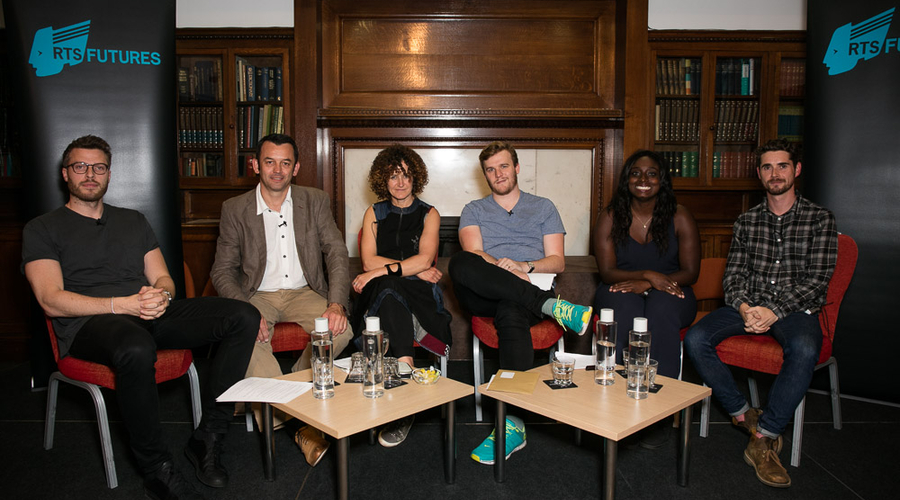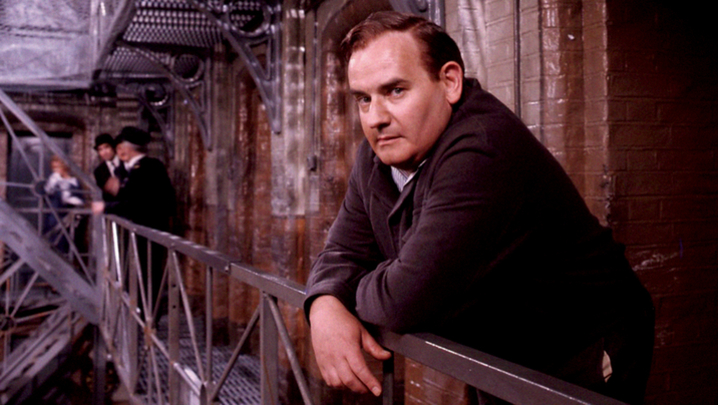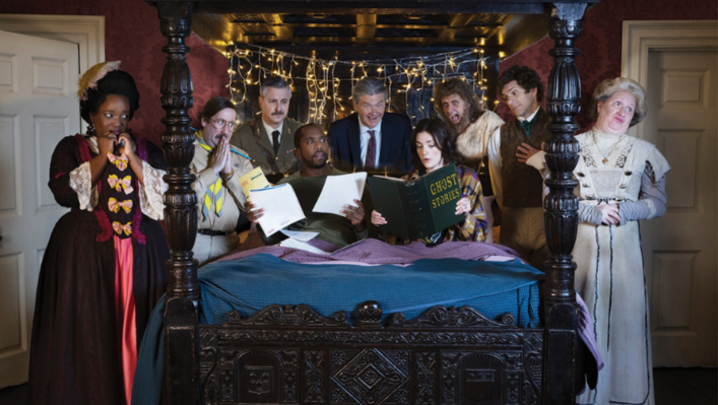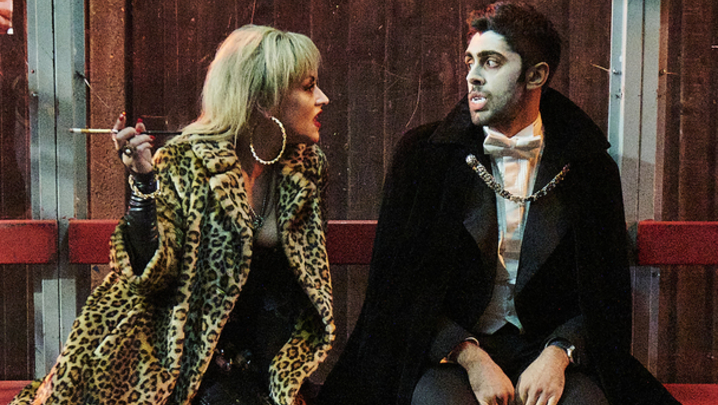An RTS event wrung some laughs from a weighty subject – how to make it in TV comedy. Matthew Bell reports
Funny ha ha? The serious business of working in TV comedy” offered invaluable advice to an audience of wannabe comedy producers and writers. The panellists, expertly chaired by Rick Edwards, the writer and presenter of ITV2 panel show Safeword, demonstrated that there are many routes into the genre.
BBC Comedy head of talent Daniell Morrisey started out in TV as a trainee floor manager on BBC One drama Casualty. He recalled this being “a massive baptism of fire at the age of 20”.
Lucy Armitage, producer of ITV hit Benidorm, began at BBC Radio 1, before being made redundant. It could have marked the end of Armitage’s broadcasting career, but losing her job proved fortuitous.
“I became a marriage, births and deaths registrar and got a call from someone who was writing a comedy set in a registry office – that’s how I got my first job in telly,” she recalled.
Comedy entertainment producer Carol Baffour-Awuah had her own radio show at university. After graduating, she secured a one-year placement at Princess Productions on the Creative Skillset trainee scheme.
Edwards was part of the same Skillset initiative. Having left university, with no plan for the future, he found himself tutoring broadcaster Ruby Wax’s children in maths and science. Wax “sat me down and asked, ‘What are you doing with your life?’ She said I should apply for this scheme.”
Gavin O’Grady wanted to be a director so he “hounded the first assistant director of the Harry Potter films”. His persistence paid off and he worked on a Potter film, before moving into music videos and commercials.
Work experience on T4’s Popworld followed, which gave him hands-on experience of filming.
The panel offered a mix of sage advice and one liners to the RTS Futures audience. BBC Comedy producer James Farrell, who joined the corporation after graduating, advised: “Surround yourself with brilliant people and make best friends with Jack Whitehall.”
But there were sobering words among the laughs. Farrell, who boasts Mrs Brown’s Boys among his credits, warned that “comedy is the most difficult genre by a mile to get into and make”. However, “the flip side is that there are very few people who are good at it, so, if you’re talented and tenacious, then you will make it”.
O’Grady, whose recent directing credits include Sky 1 panel show Duck Quacks Don’t Echo and Channel 4’s Alternative Election Night, advised: “Make your own stuff – don’t wait to get a job.”
If the work is good, O’Grady added, it will find an audience: “The great thing about comedy is that it’s much easier for it to go viral.
“People much prefer watching five-minute funny things at their desk at work than depressing things. If you can make people laugh, it has a much greater chance of being seen.
“There are so many comics out there who are dying for some upcoming director/producer to offer to direct a short film with them.”
“The job of a TV comedy producer is to find and nurture talent, whether they are performers or writers,” argued Morrisey.
“See lots of live comedy to spot the people that you may be producing in a few years’ time. Comedians such as Miranda Hart and Brendan O’Carroll took years to get from A to B but they did it with the help of producers on that journey.”
Armitage admitted that comedy was a highly competitive genre, but added that “you will know in your heart if you’ve got what it takes” to succeed.
However, the panel agreed that desire is not enough. Research, especially before an interview, doesn’t go amiss. “I interviewed about 30 radio producers last week and hardly any of them could tell me what radio shows we make,” said Morrisey.
“Throughout my entire career, from the most junior to the most senior jobs, in every genre, the biggest problem is that people are incapable of telling me about the shows we make, or they name shows from other channels,” he said. “[If they] do mention a list of shows they like, they [often] haven’t got any critical analysis of it.”
And, having broken into TV, comedy is not always a barrel of laughs. “It’s a fantastic job,” said Armitage, “but, if you’re not careful, it eats up your entire life.”
She added: “What I love about comedy is that it is so pointless – nobody needs to be doing it.”
Baffour-Awuah has a number of hits under her belt, including BBC Two’s Never Mind the Buzzcocks and BBC One’s Michael McIntyre’s Big Show.
She reinforced Armitage’s warning about the demands of the job: “There are times when I’ve been working on a script at 4am and then filming it a few hours later. If you’re on a freelance contract, then [the production company] has bought you for that time.”
Aspiring comedy writers should fire off scripts – people will look at them, said the panellists. “I read everything I get sent”, claimed Farrell, although, he admitted, “not all of everything I get sent”.
By and large, unsolicited scripts are not pounced upon and made into comedy series but, if they contain a few laughs, they can get a new writer noticed and taken under the wing of a producer.
And, sometimes, persistence can pay off. “Lots of people got pissed off with Ricky Gervais coming into the BBC, because he was a real nuisance,” recalled Armitage. “Only one person ran with it and, all credit to him, it made The Office happen.”
The RTS Futures event ‘Funny ha ha? The serious business of working in TV comedy’ was held at the Hallam Conference Centre in central London on 28 June. The producers were Carrie Britton and Iestyn Barker.
Good, bad and bizarre CVs
James Farrell: ‘If it’s more than one page I’m bored – two pages at the most.… To the point and personal is good.’
Daniell Morrisey: ‘If you want to work in comedy, say that you like comedy on your CV – [too many] people simply copy and paste emails about how they are hard-working, vibrant, blah, blah blah.’
Rick Edwards: ‘I interviewed someone the other day who runs a digital marketing agency. He got one CV delivered by an owl… but he didn’t give the person the job.’
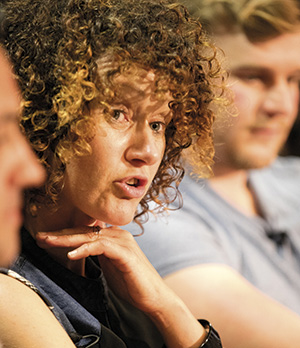
(Credit: Paul Hampartsoumian)
Daniell Morrisey: ‘The weirdest CV I’ve had was printed on a cushion – I sat on it for a few weeks.’
Top tips from the experts
Daniell Morrisey: ‘Develop [your own] taste by watching lots of comedy.’
Lucy Armitage: ‘Or read or listen to comedy… [eventually] you will find your niche. If everyone does the same thing it gets a bit boring.’
Rick Edwards: ‘Getting your foot in the door is the most important thing, and then showing what you can do when you get the opportunity.’
James Farrell: ‘Finding someone to support and mentor you is [helpful] – it’s certainly been good for me.… You have to find someone who’s willing to take a chance on you.’
Carol Baffour-Awuah: ‘Say yes to things… it can lead to something [better] happening.… Have confidence in yourself and your ideas. If you think it’s funny, the chances are that other people will, too.’
Gavin O’Grady: ‘If you pitch [an idea] confidently, people will take you more seriously.… Build relationships with the people you work with – if you’re nice and you’re good, people want to work with you again.’
Rick Edwards: ‘Preface every pitch with [the words]: “This is fucking funny.”’
Lucy Armitage: ‘Don’t be a cunt… and don’t wing things – don’t be afraid not to know something.’
Question and answer
Is there a lack of risk-taking in modern British comedy?
James Farrell: The idea that commissioners don’t take risks is a myth perpetuated by people who don’t get their stuff on television.
How can you best self-critique a script?
Lucy Armitage: If you’ve got three or four friends whose judgement you trust – and I’ve done this, so I know how hard it is – get them to read it out loud. Nothing else ever makes you realise how unfunny words can be.
James Farrell: It is how we make a real TV show, as well – we do a read-through.
I’m 28 and work in education – is it too late to work in comedy?
James Farrell: Just do it – nobody’s stopping you apart from yourself.
Lucy Armitage: It’s the other way around – you’re in the perfect place to start.
Daniell Morrisey: Jo Brand was a nurse…
Rick Edwards: And Greg Davies was a teacher. There are countless examples.
I work in entertainment – how can I switch to scripted comedy?
Lucy Armitage: Don’t be afraid of starting as a runner in comedy, even if you are further up the ladder at the moment. It often makes sense to go downwards when crossing over to another department.
James Farrell: Script-reading is something you could do at the same time as having a normal job.

